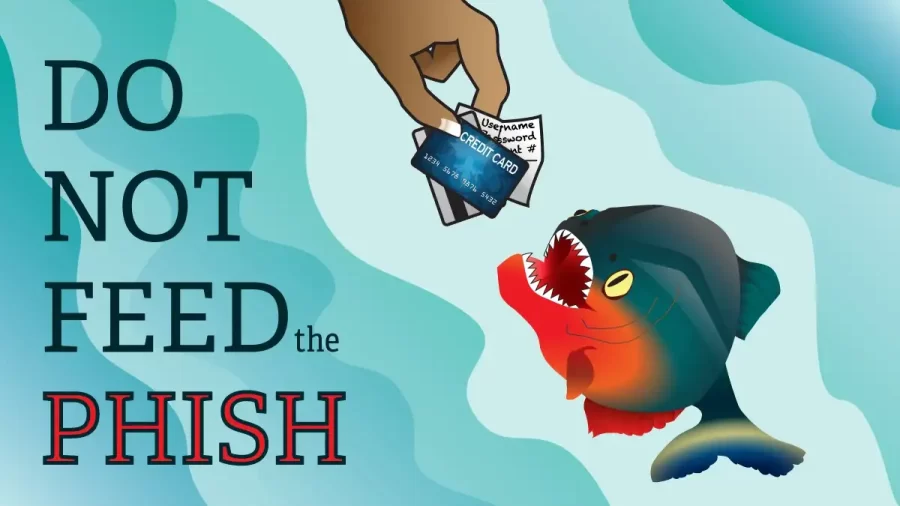Phishing emails; don’t take the bait
The cartoon fish symbolizes scammers phishing for your personal information. Be safe online and don’t let scammers hack your information! Photo via medium.
February 6, 2023
Have you ever received an email that seemed a little suspicious or just too good to be true? Then you may have been sent phishing, or scam, emails. College students are commonly the prime targets for phishing emails. Learning how to recognize a scam email is the first step to protecting yourself from these hackers.
Since college students are at a high risk for scam emails, it is important to be cautious. Laker email accounts have received thousands of phishing emails. Some scammers even have email accounts that look almost exactly like a Laker email address. Valerie Lynch, vice president of Student Services, advises that, “Students just have to be really careful. If it seems too good to be true, then second guess it and maybe reach out to someone at the college. Even asking an instructor to review it or something, so we cannot have students being taken advantage of.”
According to Earthweb.com, 3.4 billion phishing emails are sent out daily. There are several things to be on alert for when identifying these emails. Always examine the email address and the spelling of the email carefully. If it does not seem professional, it probably is not. You should also be cautious when you are sent links. Never click on a link or download anything if you are not 100 percent certain the email is legitimate. If you are ever wary of an email you receive via Laker Mail, you can always report it to the Information System and Services (ISS) team at Lake Land College (LLC).
ISS is working on providing a report button through Laker Mail for students. They have already implemented this feature for faculty and staff. The button appears at the top of the email and says, “phishing alert report.” After the button has been clicked, it sends the email to the ISS team to further examine if the email is a scam or not. Travis Rauschek, the director of Information Security, stated that they wanted to see how the reporting feature worked with staff before providing it to students. He stated that, “I do believe that it may well come to students. The issue came down to licensing.”
Rauschek stated that there are many different scams that are common among college students. Since most college students are in need of money, they are more vulnerable to these scams. He stated that, “One of the types of scams that people fall victim to, college students especially, are financial aid or scholarship scams. So, they will be saying that you qualify for a scholarship when you actually didn’t. It’s just an attacker looking for your personal information. By the time they have a lot of your personal information they actually will use it in many nefarious ways. They will either sell it on the dark web or in some cases they have even applied for financial aid as that identity.”
Work for hire scams are also very common. There are two ways for the scammers to perpetrate these scams. The first is, asking the person to send them money so they can then send them equipment that they’ll need for their job. Of course, whenever the victim sends the money, the scammer disappears. The second way is the person will send you a check and then say they need you to send them a certain amount of money back. The check will then bounce, causing the victim to lose money. Student loan scams are also a very common phishing tactic among college students. The FTC recently reported that student loan borrowers were scammed out of 23 million dollars in just debt relief scams. Rauschek stated that most of these scams are done via cryptocurrency such as bitcoin.
Rauschek echoed a bit of Lynch’s advice by stating that, “The way to avoid these types of scams are generally, if it’s too good to be true, it often is. Always verify, so verify that you are dealing with a real company. If anyone ever calls you on the telephone and says something like ‘Hey, this is PayPal and you owe $500’, immediately hang up and then actually call PayPal or actually call amazon. The reason why is because anyone can spoof a telephone number. I can spoof a telephone number. I can make it look like I am calling you from Lake Land. So, the number will actually appear like it’s from Lake Land College when it’s really not.” He also stated that if you are ever being blackmailed by a scammer, be sure to contact the Federal Bureau of Investigation (FBI).
You can never be too safe when it comes to cybersecurity. If you’re ever uncertain about someone or something, it’s better to be safe than sorry. Be cautious with your personal data and what links you open. Rauschek advised that, “If you ever feel that someone reaching out to you is obviously weird, you can always disconnect from that person. Anything that comes from a generic email address, like an ‘@outlook.com’ or ‘@gmail.com’. Anybody can register for one of those.”







